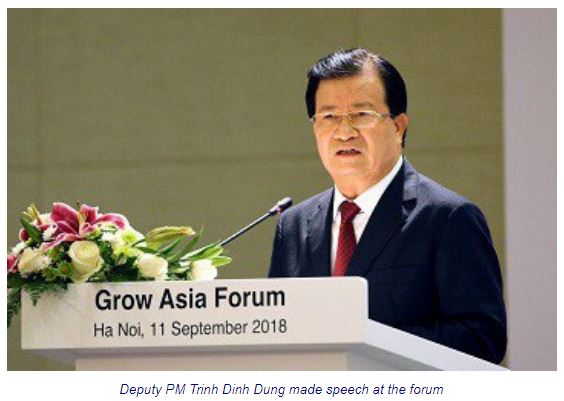Vietnam considers PPP an important tool for attracting investment: DPM
At the mini-conference of “Innovation to create change: discovering and inspiring” with 18 technical sessions, Deputy PM Trinh Dinh Dung said that agriculture is a key industry of most ASEAN countries. Agro-forestry-fishery production in the region not only ensures intra-regional food security with a population of 650 million but also contributes to ensuring global food security.
Cooperation in agriculture is also one of the most important aspects of the ASEAN Economic Community (AEC) to increase the strength and capacity of market entry of agricultural products, create links for agricultural products, increase the participation and benefits of the farmers, Dung said.
Measures to implement include promoting strategic agriculture cooperation in ASEAN through bilateral, multilateral and regional cooperation, setting up potential links in ASEAN agriculture and promoting direct investment and strategic partnerships in ASEAN agricultural cooperation between producers, customers and commercial enterprises, Dung added.
He also stressed that the Asian Growth Initiative is a linkage and multi-stakeholder partnership to assist ASEAN countries in meeting the goals set out in the WEF’s New Agricultural Initiative. The goal is to increase agricultural output by 20%, reduce carbon emissions by 20%, and reduce poverty by 20% every decade until 2030.
This is achieved through the involvement of government, business and farmers, especially through the PPP model, Dung said.
In the action plan for the restructuring Vietnam’s agriculture sector by 2020, the Vietnamese government has put agriculture at the heart of sustainable economic development, responding to climate change and building up rural prosperity. Science-technology and investment under the PPP model will be two factors that will help realize the goal of sustainable agriculture and rural development in Vietnam, Dung added.
He cited that in the current development stage, besides the government’s tectonic role and the farmer’s active role, businesses cannot stay on the sidelines.
Dung noted that in order to integrate more deeply, the agricultural sector needs to be further transformed with the wider participation of the private sector, using modern technologies of the Industrial Revolution 4.0 to transform the agriculture sector to become more modern, more efficient, more inclusive and more sustainable.


 English
English




